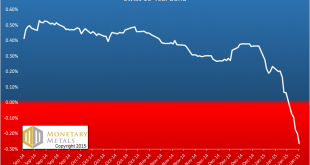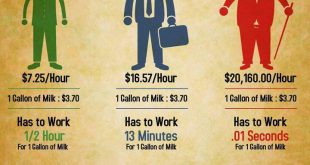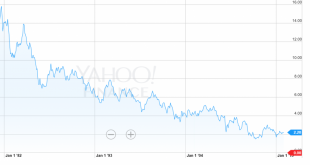The Baby Boom generation may be the first generation to leave less to their children than they inherited. Or to leave nothing at all. We hear lots—often from Baby Boomers—about the propensities of their children’s generation. The millennials don’t have good jobs, don’t save, don’t buy houses in the same proportions as their parents, etc. We have no doubt that attitudes have changed. That the millennials’ financial...
Read More »The Toxic Stew, Report 7 Oct 2018
Last week, we shined a spotlight on a crack in the monetary system that few people outside of Switzerland (and not many inside either) were aware of. There is permanent gold backwardation measured in Swiss francs. Everyone knows that the Swiss franc has a negative interest rate, but so far as we know, Keith is the only one who predicted this would lead to its collapse (and he was quite early, having written that in...
Read More »Textbook Falling Interest Behavior
Costco This is a textbook case. Well, it would be if there was a textbook that presented the dynamics of the rising and falling interest rate cycles. Costco is spending over a quarter billion dollars, to make a capital investment in chicken processing. This is not the typical entrepreneurial investment, which seeks to increase margins by serving an unserved or underserved demand. This is an investment made with...
Read More »Why Are Wages So Low, Report 23 Sep 2018
Last week, we talked about the capital consumed by Netflix—$8 billion to produce 700 shows. They’re spending more than two thirds of their gross revenue generating content. And this content has so little value, that a quarter of their audience would stop watching if Netflix adds ads (sorry, we couldn’t resist a little fun with the English language). So it is with wry amusement that, this week, Keith heard an ad for an...
Read More »Never Mind the Bollocks, Here’s the Avocado Toast, Report 16 Sep 2018
For about ten bucks a month, Netflix will give you all the movies you can watch, plus tons of TV show series and other programs, such as one-off science documentaries. They don’t offer all movies, merely more than you can watch. Oh, and there are no commercials. They don’t just give you old BBC reruns, which you know they can get for a pittance. Netflix is spending money (well Federal Reserve Notes) producing its own...
Read More »Illicit Arbitrage Cut by Tax Cuts and Jobs Act, Report 3 Sep 2018
This week, we are back to our ongoing series on capital destruction. Let’s consider the simple transaction of issuing a bond. Party X sells a bond to Party Y. We will first offer something entirely uncontroversial. If the interest rate rises after Y buys the bond, then Y takes a loss. Or if the interest rate falls, then Y makes a capital gain. This is simply saying that the bond price moves inverse to the interest...
Read More »Monetary Paradigm Reset, Report 5 August 2018
See the introduction and the video for the terms gold basis, co-basis, backwardation and contango. Explaining a new paradigm can be both simple and impossible at the same time. For example, Copernicus taught that the other planets and Sun do not revolve around the Earth. He said that all the planets revolve around the Sun, including Earth. It isn’t hard to say, and it isn’t especially hard to grasp. Indeed, one of its...
Read More »Janet Yellen Fights the Tide of Falling Interest
On Wednesday Dec 16, Federal Reserve Chair Janet Yellen announced that the Fed was raising the federal funds rate by 25 basis points. Let’s get one thing out of the way. This is not a move towards free markets. Whether the Fed sets interest lower, or whether it sets interest higher, we still have central planning. We still have price fixing of interest rates. Interest rates may be set too low. However, forcing interest up is no cure. We need to eliminate central planning, and move to a free...
Read More »Falling Interest Causes Falling Profits
Most people assume that prices move as a result of changes in the money supply. Instead, let’s look at the effect of changes in interest. To start, consider a hamburger restaurant. Suppose that the average profit in the burger business is ten percent of invested capital. If MacDowell’s is thinking about expanding, it has to consider the interest rate. Why? Typically, most of the capital to expand a business is borrowed. MacDowell’s has to borrow the cash to build out its new store. If the...
Read More » Swiss Economicblogs.org
Swiss Economicblogs.org









